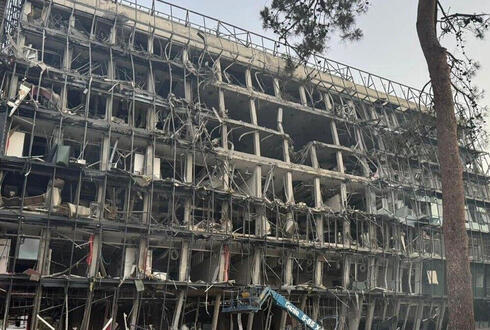
“Catastrophic loss”: Inside the destruction of Weizmann’s research labs
Scientists scramble to save freezers, data, and years of research from missile-hit buildings.
After the Weizmann Institute of Science suffered a direct missile strike on Sunday, and another landed near the Technion – Israel Institute of Technology in Haifa, universities across Israel are asking: who’s next?
According to estimates, the value of the Weizmann building that was hit ranges between $50 million and $100 million. University officials now believe that Iran views Israeli academic institutions as strategic assets, a perception that has prompted a ban on campus presence and laboratory work at several institutions.
The full extent of the damage is still being assessed, but several buildings dedicated to life sciences research, including cancer research, were severely damaged, along with a building focused on environmental sciences. A senior academic estimated that the cost of building an empty laboratory facility is around $50 million, and up to $100 million when outfitted with sophisticated equipment. Another expert noted that lab buildings are among the most expensive to construct, second only to hospitals, with an estimated cost of 25,000 shekels per square meter, amounting to 100–250 million shekels per building, not including specialized instruments worth millions of dollars.
“The damage to some laboratories is catastrophic,” said Prof. Sarel Fleishman of the Faculty of Biochemistry at Weizmann. “In life science labs, much of the knowledge is embedded in the devices and freezers, materials developed by researchers over many years. Now we are scrambling to extract what we can and relocate as fast as possible.”
Fleishman’s own lab suffered relatively minor damage, and he is now hosting displaced colleagues.
He explained that these labs study evolutionary and physiological mechanisms, often with applications in drug discovery and cancer diagnostics. “Entire research wings have been destroyed. Some labs have lost all their materials, materials whose value lies in years of expertise and effort. This isn’t just infrastructure loss; it’s decades of student research and life-saving work that may be gone forever,” he said. “It will take years to rebuild. But I believe we will overcome this. The Weizmann community is resilient, and the support we’re receiving globally is invaluable.”
Prof. Daniel Haimovich, president of Ben-Gurion University and chairman of the Council of University Presidents, added:
“No scientific pursuit is worth risking the life of a student or a researcher. Campuses are empty because we know we could be targeted. And now we’ve seen, there’s no distinction between day and night.”
Haimovich stressed that the loss of Weizmann’s cancer research labs represents irreplaceable damage: “When a lab and all its samples and documentation are destroyed, it’s a disaster. We’ll never know which potential treatment or cure has been lost. The cost to human health is immeasurable.”
For security reasons, university officials declined to specify what protective measures are being taken. However, it’s believed that extensive digital backups of research data are now a key priority.
Israeli academia is globally recognized, with Weizmann, Technion, and Hebrew University consistently ranking among the world’s top 100 universities in the Shanghai rankings. But since the start of the judicial overhaul, universities have come under dual pressure: on one front, the government, especially Education Minister Yoav Kisch, has sought to take political control of The Council for Higher Education and key academic bodies; on the other, since the outbreak of war, Israeli academia has faced hundreds of global boycott efforts, many triggered by inflammatory statements from ministers about the expulsion of Gazans and obstruction of humanitarian aid.
Against the backdrop of the government's growing hostility toward academia, some researchers have remarked ironically that Iran seems to value Israeli science more than the Israeli government does.
“It’s clear that Israeli academia is a target,” said Haimovich. “The Weizmann Institute and other institutions have been deliberately hit. At least the Iranians recognize the power of science, unlike our own government.”
He recounted a conversation with a senior government official who blamed the BDS movement on Israeli academics:
“We’re treated as enemies of the people, even though our research fuels the very technologies that defend Israel. The pilots, the intelligence units, the engineers - they all come from our universities.”
Haimovich concluded: “The government must understand that investing in research is the best security investment Israel can make. Scientists need independence to pursue discoveries. The greatest threat to academia is politicization, particularly of institutions like The Council for Higher Education, where political interests may override scientific merit.”















